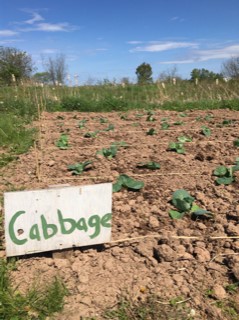Research
The Acadia Farm offers many opportunities for field research conveniently located on campus. Student and faculty research projects explore a variety of topics such as organic methods for enhancing plant growth, integrated pest management techniques and how a campus farm can enhance student learning.
Research partners include the K.C. Irving Environmental Science Centre, the Departments of Biology, Chemistry, the School of Nutrition and Dietetics and more. A few projects are highlighted below.


Preliminary field evaluation of a rock dust product for pest herbivore management.
by Nicoletta Faraone, Department of Chemistry and N. Kirk Hillier, Department of Biology
The effects of a rock dust in dry and aqueous formulations were evaluated under field conditions for controlling insect pests in different crop systems and ornamental plants. Pest control efficacy through foliar applications was tested on lily, squash, and cabbage plants evaluating subsequent pest damage, overall plant health, and quantity of produced crops. Dry and aqueous formulations had the best level of protection (>1% and 11% of herbivory damage, respectively) compared to the control treatment (30% of herbivory damage), and lily plants were better protected following application of the rock dust. Cabbage plants were more susceptible to herbivory damage, and no statistically significant differences were reported within treatments. The foliar applications (dry and aqueous formulations) had positive impacts on growth of squash fruit resulting in a 2.5-fold increase in size relative to the control squash fruit.
Monitoring and controlling persistent cabbage maggots.
by Loay Jabre and N. Kirk Hillier, Department of Biology
This project explored the development of a means to monitor and control cabbage maggots without the need for insecticides (i.e. In a completely organic manner, using semiochemical attractants). Cabbage maggots are prevalent pests on cabbage, rutabagas, broccoli, cauliflower, radish, brussel sprouts, and much more. Their larvae attack the root stock of these plants and burrow throughout the crop.
Resource use and freedom of the commons: Why a liberal arts education in ecological literacy is fundamental to the human prospect.
by Emily C. S. Beveridge, Honours student, Environmental Science
This Honours thesis explored how the Farm could be integrated into Acadia curriculum to enhance learning and foster ecological literacy. It examined whether the incorporation of community-based agricultural concepts into a liberal arts education could contribute to a greater understanding of sustainability and human dependency on ecosystem functioning among students and the general populace. Findings suggested that integrating the Acadia Community Farm in all areas of study could serve as a vector for disseminating knowledge of ecosystem functioning and human reliance on the biosphere. Further conclusions were that interpenetration of abstract and practical components of involvement with the farm into the various disciplines at Acadia University is likely an important step toward the development of sustainable environmental policies.
